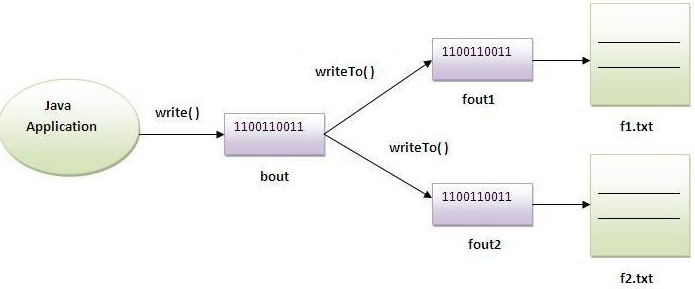Java ByteArrayOutputStream Class
Java ByteArrayOutputStream class is used to write common data into multiple files. In this stream, the data is written into a byte array which can be written to multiple streams later.
The ByteArrayOutputStream holds a copy of data and forwards it to multiple streams.
The buffer of ByteArrayOutputStream automatically grows according to data.
Java ByteArrayOutputStream class declaration
Let's see the declaration for Java.io.ByteArrayOutputStream class:
Java ByteArrayOutputStream class constructors
| Constructor |
Description |
| ByteArrayOutputStream() |
Creates a new byte array output stream with the initial capacity of 32 bytes, though its size increases if necessary. |
| ByteArrayOutputStream(int size) |
Creates a new byte array output stream, with a buffer capacity of the specified size, in bytes. |
Java ByteArrayOutputStream class methods
| Method |
Description |
| int size() |
It is used to returns the current size of a buffer. |
| byte[] toByteArray() |
It is used to create a newly allocated byte array. |
| String toString() |
It is used for converting the content into a string decoding bytes using a platform default character set. |
| String toString(String charsetName) |
It is used for converting the content into a string decoding bytes using a specified charsetName. |
| void write(int b) |
It is used for writing the byte specified to the byte array output stream. |
| void write(byte[] b, int off, int len |
It is used for writing len bytes from specified byte array starting from the offset off to the byte array output stream. |
| void writeTo(OutputStream out) |
It is used for writing the complete content of a byte array output stream to the specified output stream. |
| void reset() |
It is used to reset the count field of a byte array output stream to zero value. |
| void close() |
It is used to close the ByteArrayOutputStream. |
Example of Java ByteArrayOutputStream
Let's see a simple example of java ByteArrayOutputStream class to write common data into 2 files: f1.txt and f2.txt.
Output:
f1.txt:
f2.txt:

| 
 For Videos Join Our Youtube Channel: Join Now
For Videos Join Our Youtube Channel: Join Now









